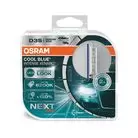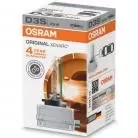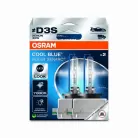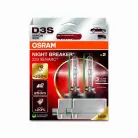OSRAM
Original Equipment Quality automotive lighting.
OSRAM Xenarc Cool Blue Intense Next Gen D3S (Twin)
1 Reviews customer review
€191.09
Up to 12 months free warranty
5 views in the last 24 hours- Up to 6200K
- Styling Bulb - LED Look
- Up to 150% brighter
- Crisp white light
€191.09
Up to 12 months free warranty
More InfoOSRAM Xenarc D3S Xenon (Single)
28 Reviews customer reviews
RRP: €90.99
€64.60
Up to 12 months free warranty
7 views in the last 24 hours- Standard Bulb
- Long lifetime
- Up to 4500K
- 300% more efficient
RRP: €90.99
€64.60
Up to 12 months free warranty
More InfoOSRAM Xenarc Cool Blue Boost D3S (Twin)
6 Reviews customer reviews
RRP: €337.99
€189.01
Up to 12 months free warranty
6 views in the last 24 hours- Up to 7000K
- Blue-white light
- Styling bulb
- Not road legal
RRP: €337.99
€189.01
Up to 12 months free warranty
More InfoOSRAM Xenarc Night Breaker Laser (Next Gen) D3S (Twin)
No customer ratings yet
€209.16
Up to 12 months free warranty
- Maximum performance
- Up to 220% brighter light
- Approx 250m length beam
- Fully road-legal
€209.16
Up to 12 months free warranty
What are Xenon headlights?
You’ll be able to easily spot xenon headlights on the road, thanks to their ice white/blue tint and extreme brightness. But how exactly do these headlights work?
Xenon HID (High Intensity Discharge) bulbs are filled with Xenon gas and contain two electrodes - one on each end of the tube-like bulb. When the bulb is switched on, an electric current passes between the two electrodes and the Xenon gas lights up. The Xenon gas is actually only used during the start-up of the bulb. Once the desired temperature inside the lamp is reached, other gases inside the bulb ensure it stays lit.
If your car normally uses halogen bulbs, you won't be able to easily switch your existing bulbs to Xenon headlights. The bulbs themselves work in a different way, meaning that halogens and HIDs have different shapes and connect to your car differently.
If you're set on using HIDs in your car, you can use a HID Conversion Kit, which allows you to convert your halogen headlights to Xenon HID. These kits are not road legal and can damage your vehicle if bought from a non-reputable seller. If you wish to purchase a HID Kit, we would strongly recommend buying from a trusted supplier.
Shop HID Conversion Kits here.
Be careful when purchasing Xenon HID bulbs. Some bulbs are marketed as using Xenon gas, but these may simply be halogen bulbs that use Xenon gas to give them a boost of white light. A good way to check if you're looking at a halogen or a Xenon is to go by fitting. If the fitting begins with a 'D' (for example, D2S), you're looking at a Xenon. Bulbs with a 'H' at the beginning of the fitting (e.g H4) are halogen.
There are also lots of counterfeit Xenon bulbs on the market which can easily fool even the savviest of bulb buyers. Always buy Xenon HIDs from verified sellers to protect yourself and your car. Read more about counterfeit bulbs here. .
What are the benefits of Xenon headlights?
The first and most obvious reason why people prefer Xenon HID over other headlight types is brightness. Xenon bulbs are much brighter than halogen, giving you better visibility during night time driving.
Xenon bulbs can also produce higher colour temperatures than halogen. Halogens become non-road legal when they reach a colour temperature of 4300K and are limited in terms of producing a bluish light. However, HIDs can reach much higher colour temperatures easily whilst remaining road legal. This means that you can achieve a very strong, stylish ice white/blue light on the road with a Xenon bulb.
The final advantage of Xenon HIDs is their longevity. Xenon bulbs last much longer than halogen, so you don’t have to replace them as often. While individual xenon bulbs cost more than halogen bulbs, they can save you money in the long run. .
How do I know if I have xenon bulbs?
The easiest way is to use our Bulb Finder, or check your vehicle handbook. HID light fittings start with the letter D, for example, D1S, D2S, or D2R.
If you're still unsure, have a look at the light beam at night. If it's bright and white, rather than a yellowish colour, you're likely to have HID lights fitted in your vehicle.
How do I install HID bulbs?
Due to the high wattages involved, we recommend that an auto-electrician replace your HID lights.
Are they worth it?
Many drivers want to know if Xenon bulbs are worth the money. We think they are! You'll benefit from a strong, bright white light that offers both style and safety. Plus, you don't have to worry about replacing them as often - win win!

















.png)



